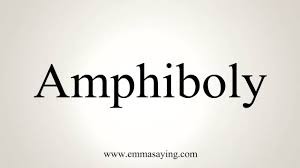
Definition:
Ambiguity of speech, especially from uncertainty of the grammatical construction rather than of the meaning of the words, as in The Duke yet lives that Henry shall depose.
Examples:
The phrase transcendental object occurs once in the second Analogy and twice in the Note on amphiboly.
A Commentary to Kant's 'Critique of Pure Reason' Norman Kemp Smith
This, it may be noted, is in keeping with the passages above quoted from the section on amphiboly.
Passages which expound it in this later form occur in the Note on amphiboly and throughout the Dialectic.
Did you know?
Mr. Farrell noted a current commercial ... in which the candidate said, “I’m Don Cazayoux and I approved this message because that’s who I'm fighting for.” That, Mr. Farrell said, is “an amphiboly, a logical confusion created by a grammatical ambiguity.” Steve Friess, "Candidates 'Approve' Ads and Get a Bit Creative," New York Times, September 30, 2008.




